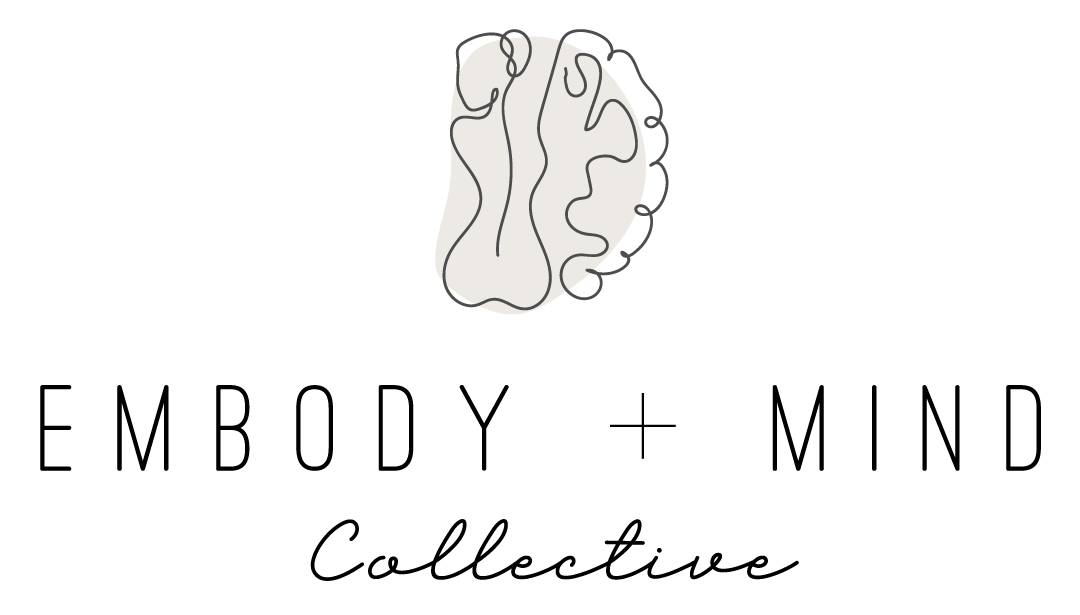Trauma Therapy
The very word, trauma, can evoke specific and personal physical reactions, emotions, and thoughts from each and every one of us. We are all working with our own definitions of how we understand what trauma is, based on our past experiences and our perception of the world, which have been shaped by one another. Here at Embody + Mind Collective, we believe in the power of defining our words to create an environment of clarity and choice. Our definition of trauma is any event, or series of events, that overwhelms our capacity to cope in the moment. Trauma is the inability to be in the here and now. Trauma is a loss of relationship, including how we are in the world and our various relationships with ourselves and others.
Trauma has been categorized into two different types, “Big-T Trauma” and “Little-t Trauma.” Big T Trauma includes those disturbing events that come to mind when we hear the word “traumatic,” such as war, natural disasters, the loss of a loved one and plane crashes. Little t-Trauma could be those events that might be less memorable but hurtful. These types of trauma are far more prevalent in our childhoods and may include bullying, misattunement from loved ones, not feeling seen or understood by your caretakers, or even not enough good things happening in your life.
Our team at Embody + Mind Collective specializes in treating trauma, specifically, developmental, intergenerational, perinatal and birth trauma, and complex trauma.
We provide support to those dealing with:
Developmental Trauma
Developmental trauma refers to trauma that has occurred during childhood due to chronic abuse or neglect, or dysfunction in the home. It can also occur when not enough good things happen to you or around you on a regular basis growing up. When these events happen and our caregivers are either at the cause of them or not protecting us from them, we can become traumatized developmentally. Developmental trauma is what is at the heart of the ACE studies that link adversity during childhood to later adult disease and health complications. Here at Embody + Mind Collective we understand the links between our younger parts of self and our current struggles.
Intergenerational Trauma
Intergenerational trauma, or sometimes called transgenerational trauma, is a category of trauma that is concerned with the generational challenges within families. It is the impact that a traumatic event can have not only on that individual who personally experiences it, but also on subsequent generations following the event. The transmission of this negative event, or series of events, can negatively impact future generations within this family line. These experiences are often a result of trauma that has happened to our parents and our parents’ parents. The clinicians at Embody + Mind Collective are committed to empowering you to break these cycles so that the past does not repeat itself and we can bring more intention to our lives.
Perinatal PTSD and Birth Trauma
Perinatal PTSD is a type of anxiety disorder that occurs as the result of traumatic experiences during pregnancy, labor, or childbirth. Some examples might include emergency Cesarean delivery, postpartum hemorrhage, prematurity or stillbirth, unexpected NICU admission, traumatic vaginal birth, fetal anomaly, witnessing partner’s birth experience, or a long labor process. Birth trauma is an experience which occurs during the labor and birth process that might involve actual or threatened serious injury or death to the mother of her infant. Another common theme seen regarding birth trauma is the mother feeling as though she has been degraded or stripped of her dignity. Our team at Embody + Mind Collective has extensive training in perinatal PTSD and birth trauma and how to support you in healing from it.
Complex Trauma
Complex trauma describes being exposed to multiple traumatic events, often beginning in childhood, and having a pervasive and interpersonal nature. These events are often severe, invasive, and prolonged. These experiences often occur within the primary caregiver relationship or social environment growing up. Our experiences of complex trauma can impact our abilities to be present, our quality of life, as well as our abilities to connect with ourselves and others. Complex trauma can often result in chronic pain, autoimmune disorders, and sometimes being told by others that “it is all in your head.” Here at Embody + Mind Collective, we understand that your experiences are valid and impactful. Even though they cannot always be explained by modern medicine, they do affect our mental, emotional and physical well-being. We understand the connection that our minds and bodies share with one another and its importance in focusing on this in effective trauma treatment, hence why clinicians are trained in somatic psychotherapies. Recovery is possible and we can help you get there.
Treatment
As stated above, trauma impacts our capacities to be in the present moment. It separates us from our bodies. And since our bodies are primed for survival, overwhelming past experiences may result in our survival responses being activated regularly. When we are in our survival responses, connection isn’t possible as most of our energy is being utilized to survive. For example, even if we cognitively might know that we are not being chased by a bear, if our body is experiencing an event as danger, it will respond in accordance. In therapy, we work together to be more present to what is happening in the here and now by separating out our own judgment and replacing it with compassion and curiosity.
Our trauma-informed clinicians take all this into account when providing therapy. We practice presence, attunement, compassion and non-judgment. Coming from a research-backed stance, we know that the body must be included in treatment in order to fully heal. As such, in addition to traditional talk therapy, we utilize body-centered approaches to healing trauma including Somatic Experiencing, Somatic Touch, and Art Therapy.
Somatic Experiencing
Somatic Experiencing (SE™) is a body-oriented therapeutic approach to helping people heal from their traumas. It teaches people to tune into their body responses with curiosity and begin to track their experiences. It helps people separate out fear from these body responses and creates space to explore our natural and adaptive physiologies.
Somatic Touch
Like Somatic Experiencing, Somatic Touch is also a body-oriented approach that helps people regulate their nervous systems. It is a more hands-on approach that is based in the science of co-regulation. Somatic Touch helps people sense into their own nervous system regulation and learn ways to practice this at home. As our sense of touch is the first sense to develop in utero, Somatic Touch also helps those people who have experienced trauma experiences preverbally.
Art Therapy
Understandably, sometimes the idea of talking about our traumas becomes a barrier to us asking for help with them. Since art therapy is creative expression, it doesn’t always require words. Art therapy can allow you to process your trauma without words. Art therapy requires us to inquire and attune to ourselves on creative kinesthetic, sensory, affective, symbolic, perceptual and cognitive levels.
OUr approach: healing through body + mind
Whether you are looking for compassionate support, integrated feelings of embodiment or more directive guidance towards living your fullest life, individual therapy may be for you. Catered to your specific needs, this may include talk therapy, Somatic Experiencing, or incorporating Somatic Touch.

Healing starts with more presence
Enter your name + email to download our free 5 minute arrival orientation!




